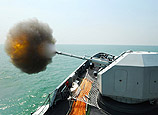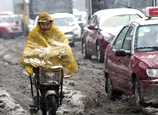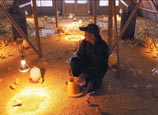
BEIJING, April 19 (Xinhua) -- The Chinese government on Tuesday vowed to overhaul food safety standards and crack down on illegal food additives in its latest move to improve food safety.
In a circular that sets major tasks for food safety in 2013, the State Council also pledged to improve supervision and crack down on the use of food additives and pesticide residue, as well as target other food-related violations.
Overlapping food safety standards and loose supervision have been blamed for China's multiple food scandals.
Some Chinese believe food safety standards in China are less strict than those in the United States, Japan and Europe. Many also believe that government supervision has been circumvented by bureaucracy and corruption.
From food production to consumption, at least five Chinese government departments and agencies are involved in supervision. The overlapping of power makes supervision efforts less centralized and allows authorities to pass the buck.
Although progress has been made through repeated government campaigns launched to eradicate food safety violations, the issue still remains problematic for many Chinese.
In recent scandals, farmers have fed pigs with clenbuterol to produce leaner pork, liquor makers have used plasticizer to thicken their spirits and dairy manufacturers have used expired powder and changed their production dates.
To deter food safety violations, the top legislature passed an amendment to the Criminal Law so that those held responsible for serious food crimes can be subject to the death penalty.
New efforts are being made to merge multiple food and drug safety agencies into one regulatory body in order to improve efficiency.
The government is also trying to encourage participation by local officials, who are motivated to cover up scandals in order to prevent disgrace resulting from social unrest.
In 2011, three senior officials from animal husbandry bureaus in central China's Henan Province were suspended from their posts after local farms were found to be adding the fat-burning additive clenbuterol to their pig feed.
However, improved standards and tightened supervision have yet to provide a true solution for China's food safety issues.
A failure to promote business ethics and cultivate morality has turned China into a market where cheap counterfeit goods sell in greater number than safe genuine goods.
Part of the answer to the food safety quandary lies in fostering honesty and showing food companies that violating food safety laws is immoral. Education is the key.
Education can complement supervision and punishment, as it can help to mobilize the public so they may supervise and boycott potential violators.
Ever since food contamination cases were first reported in China in the 1990s, the media has played an important role in disseminating knowledge on food contamination and its consequences, thus improving public understanding of health issues.
Although this understanding has failed to stop many unscrupulous producers, positive changes have occurred.
Over the past 10 years, the Chinese have become increasingly outspoken in the arena of public health, particularly via the Internet.
Food safety problems are not limited to China. Industrial nations like the United States and Japan experienced similar growing pains. Back in the 19th century, authorities in the U.S. had to deal with contamination in food manufacturing and processing.
Aside from tightened supervision and more publicity for food safety, the U.S. and Japan have also made food safety part of primary and secondary education.
In a country where counterfeiters believe the cost of violating public trust is small in comparison to their profit margins, perhaps the best place to cultivate basic morality is in schools. 
Latest development of H7N9 in China[Special]
















 Snowfall hits Taiyuan, N China
Snowfall hits Taiyuan, N China


![]()
